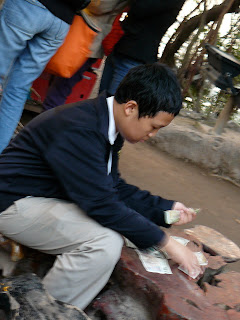We judge almost all the time. We judge others based on how and what we perceived them to be. We judge based on our previous encounters and experiences with them – although sometimes these encounters were deep and significant while at other times these were merely superficial and short. But we still judge nonetheless.
I was recently humoured during the recent nation-wide election held at my very dear country. This is the time when we citizens get to exercise our judgment by judging the different political parties involved – all hotly competing to win over some limited but significant seats in the parliament. And our duty is to vote for the parties and individuals whom we perceived to possess the abilities to help guide the nation’s journey for the next 5 years at least. One party kept on insisting that we exercise our judgment carefully by judging the parties based on their ‘track-record’.
Now in one look, it seems like a normal thing to do. But if one is more sensitive, one will realize that a good ‘track-record’ does not necessarily equate to a good performance for the present day and for the future. Different times will entail different situations and environment and will require different measures. A student of History should know very well THAT basic principle of life. Frequently we learnt in History that many a times different authoritarian leaders rose up to power due to different reasons. Countries too went to war because of varying complicating circumstances and factors. They just aren’t the same. Generalization did not do much to help us in our analysis. Period. Thus, being able to overcome past challenges is one story but the future challenges sure are different in many aspects. So how could one judge and perceive that some individuals or groups have what it takes to ride on the waves of the nation’s future just based on the successes of the past?
This issue is increasingly troubling as I ponder deeper. The question that strikes deep is why do humans always keep to the same people and the same ‘tried and tested’ route in their selection for the best man/woman/way to do a job well-done? Why do the same individuals always get a chance to display their capabilities whilst in so doing, serves also to deprive others (who are perhaps less well-known) from the opportunity to show what they may be capable of? It is like a question of why do sons and daughters of kings and emperors always too often rise to fame and given glorious positions in society whilst sons and daughters of farmers often remain to be a ‘mediocre’ and almost unnoticeable in society – regardless of whether they are blessed with potentials.
The end result of such a stark and rigid cycle where the rich and the famous got richer and more famous is not so much that one group will be more privileged and the other more disadvantaged. Consequently, it is a lose-lose situation for the society as a whole since the rich and famous, in taking up significant positions ,would consequently be burdened to conform to the ‘tried and tested’ route for fear of being judged under the societal gaze while the farmers remained, yes.. a mediocre. Both cases show the burden of individuals all essentially conforming to an accepted although unspoken societal caste system and in so doing, sacrificed the possible human potentials and treasures which they may each possessed but unfortunately remained to be buried and undiscovered. Of course there are bound to have some individuals who somehow fought and bled to get out of conformity. They were the lucky ones who finally unburdened themselves from the societal gaze and expectations. They were the lucky ones who somehow did manage to discover the precious talents which they possessed and have been blessed with. However they still remain to be the countable minority…
And at the end of the day, can we really blame the leaders if they continuously asked us to look at “track-records”? Honestly, do you think they will use that method if the society will not be lured by it in the first place? Honestly, do you think that we have somehow indirectly given them the mandate to do so…? Honestly, do you…?


























